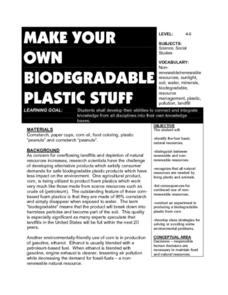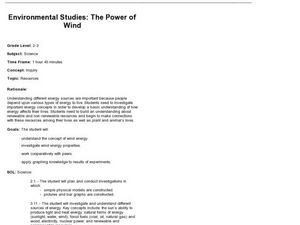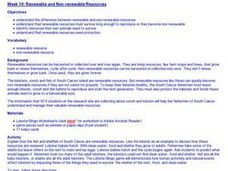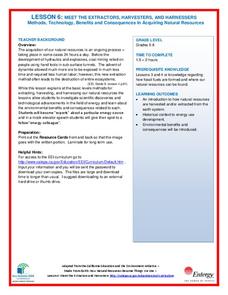Curated OER
Renewable vs. Non-Renewable Resources
Fifth graders are introduced to the important topic of renewable, and non-renewable, resources. They are expected to be able to correctly categorize different types of resources as renewable or non-renewable. Another emphasis of this...
Curated OER
Renewable vs. Non-Renewable Resources
Here's a fine lesson plan on renewable and non-renewable sources of energy for your 5th graders. In it, learners list a number of natural resources on the board, then try to sort the resources into appropriate categories. This helps them...
Curated OER
Renewable vs. Non-Renewable Resources
Fifth graders identify renewable vs. non-renewable resources and comprehend why conservation of resources is important. They are asked what they think the words natural and resource mean. Pupils then put the words together to define...
Curated OER
Make Your Own Biodegradable Plastic Stuff
Students identify the four basic natural resources. They distinguish bettween renewable and non-renewable resources. Pupils recognize that all natural resources are needed by living plants and animals. Students list consequences for...
Curated OER
Paper or Plastic: Exploring Renewable Resources.
Learners discuss, develop, invent, and implement a plan for making informed personal economic decisions about renewable resources.
Curated OER
Environmental Studies: The Power of Wind
Investigate the prospect of wind as a renewable resource. Second and third graders make a pinwheel, answer critical thinking questions, and then attempt to use wind power to wind string. I would be more apt to use this lesson in a 1st or...
National Wildlife Federation
Fossil Fuel Extraction Activity
Extracting oil is more difficult than many think! Learners work together and get hands-on as they represent oil companies drilling for oil by simulating oil extraction using beans. They identify the challenges faced in using...
Curated OER
Renewable and Non-renewable Resources
Students play Lobster Bingo on a provided worksheet. This game demonstrates how human activities and natral events affect lobsters by impacting their food, clean water, and shelter of the reef.
Bonneville
Why Use Renewable Energy?
Renew one's interest in renewable energy sources. Scholars learn about the advantages and disadvantages of various renewable and non-renewable energy sources. They conduct an activity to simulate the greenhouse effect and take part in a...
Curated OER
Conservation of Energy
Fifth graders examine their use of energy over a certain time period. They come up with a plan to reduce their energy consumption and carbon footprint. Groups of learners complete a chart with three columns; energy-using events, the form...
Curated OER
Energy Crisis and Energy Alternatives
In this energy crisis and energy alternatives worksheet, students fill in the blanks of sentences when given terms related to the environment, the energy crisis, renewable resources and non-renewable resources.
Curated OER
Fracking: Positive or Negative Impact?
Your teenagers may have heard of fracking, but do they really know what it is? And could they debate the benefits and risks? Educate your environmental science class with a lesson about hydraulic fracturing, non-renewable energy sources,...
Curated OER
Kids Need Natural Resources
Third graders define renewable and non-renewable resources and give multiple examples of each type of resource. In this environmental science lesson, 3rd graders sort picture cards into two categories, renewable and non-renewable...
Curated OER
Renewable Energy Sentences
Students construct sentences using nouns and verbs from a "renewable energy" word bank. In this cross curriculum ecology and sentence structure grammar and mechanics lesson, students listen to the book Our Earth: Clean Energy by Peggy...
National Wildlife Federation
An Energy Mix: Renewable and Nonrenewable Resources
What did the windmill say about renewable energy? I'm a BIG fan! Lesson three in the series of 12 has classes discuss potential and kinetic energy and then, in pairs, they complete a web quest over the different types of energy...
Curated OER
I Feel Renewed!
Students participate in a simulation of the equal and unequal distribution of the earth's renewable resources. They discuss renewable resources and how food resources can increase and decrease, participate in the simulation, and analyze...
Science Matters
Renewable and Nonrenewable Resources
Did you know there are at least 12 different energy sources? Scholars apply their knowledge about the different types of energy as they sort energy sources by renewable and nonrenewable. Then they pick one from each section to explain in...
Curated OER
Renewable vs. Non-Renewable Resources
Fifth graders, after brainstorming why conservation of resources is important, distinguish between renewable and non-renewable resources. They make a list of different types of natural resources on the board and then sort them into two...
Curated OER
Sources of Energy
Fifth graders take a close look at how energy changes from one form to another within their surroundings. They also study the ten different sources of energy and determine which are renewable and which are non-renewable. This seven-page...
Curated OER
Energy Sources and Use
Fourth graders study renewable and non-renewable sources of energy. Using the internet and multiple websites, 4th graders research and compare alternative energy sources. They present their findings to the class.
Wind Wise Education
Understanding Forms and Sources of Energy
What is the difference between a form of energy and a source of energy? This first activity in a series of 19 lessons uses demonstrations and discussions to introduce energy to the class. Through using hand-generator flashlights,...
Curated OER
Global Resources: What Will You Do with Your Power?
Students examine the human impact on natural resources. They read and discuss an article, evaluate nations regarding their environmental problem-solving, develop a presidential speech on the environment, and conduct a natural resources...
National Wildlife Federation
Meet the Extractors, Harvesters, and Harnessers: Methods, Technology, Benefits and Consequences in Acquiring Natural Resources
There are advantages and disadvantages to all sources of energy; the trick is determining which one has the least impact! Part six in the series of 12 has learners further explore energy resources. After reading information about one of...
Curated OER
What is an Ecological Footprint?
Introduce youngsters to the term ecological footprint. Learners identify ways in which humans affect the environment. They look at the problems associated with the use of natural resources, and focus on ways to preserve natural...

























